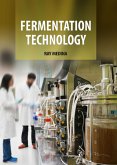Fermentation is a metabolic process that consumes sugar in the absence of oxygen. The products are organic acids, gases, or alcohol. It occurs in yeast and bacteria, and also in oxygen-starved muscle cells, as in the case of lactic acid fermentation. The science of fermentation is known as zymology. Fermentation process by which the living cell is able to obtain energy through the breakdown of glucose and other simple sugar molecules without requiring oxygen. Fermentation is achieved by somewhat different chemical sequences in different species of organisms. Two closely related paths of fermentation predominate for glucose. When muscle tissue receives sufficient oxygen supply, it fully metabolizes its fuel glucose to water and carbon dioxide. Fermentation is a process which does not necessarily have to be carried out in an anaerobic environment. For example, even in the presence of abundant oxygen, yeast cells greatly prefer fermentation to aerobic respiration, as long as sugars are readily available for consumption (a phenomenon known as the Crabtree effect). The antibiotic activity of hops also inhibits aerobic metabolism in yeast. The aim of the book is to provide an in-depth study of the principles of fermentation technology and recent advances and developments in the field of fermentation technology, focusing on industrial applications.
Dieser Download kann aus rechtlichen Gründen nur mit Rechnungsadresse in A, B, BG, CY, CZ, D, DK, EW, E, FIN, F, GR, HR, H, IRL, I, LT, L, LR, M, NL, PL, P, R, S, SLO, SK ausgeliefert werden.









